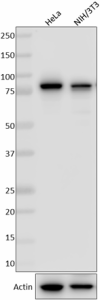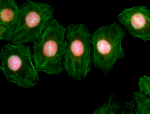- Clone
- 9F12B04 (See other available formats)
- Regulatory Status
- RUO
- Other Names
- ATP-dependent RNA helicase DDX1, DEAD box protein retinoblastoma (DBP-RB)
- Isotype
- Mouse IgG1, κ
- Ave. Rating
- Submit a Review
- Product Citations
- publications

-

Whole cell lysates (15 µg protein) from HeLa and NIH/3T3 cells were resolved by electrophoresis (4-20% Tris-glycine gel), transferred to nitrocellulose, and probed with 0.1 µg/mL (1:5000 dilution) purified anti-DDX1 antibody, clone 9F12B04 . Proteins were visualized using chemiluminescence detection by incubating with HRP goat anti-mouse-IgG secondary antibody (cat. No. 405306). Direct-Blot™ HRP anti-β-actin antibody (Cat. No. 643807) was used as a loading control (lower). Lane M: MW ladder. -

HeLa cells were fixed with 2% PFA for ten minutes, permeabilized with 0.5% Triton X-100 for five minutes, and blocked with 5% FBS for 30 minutes. Then the cells were intracellularly stained with 2 µg/mL purified anti-DDX1 antibody (clone 9F12B04) followed by Alexa Fluor® 594 (red) conjugated goat anti-mouse IgG in blocking buffer for two hours at room temperature. Actin filaments were labeled with Alexa Fluor® 488 Phalloidin (green). Nuclei were counterstained with DAPI (blue). The image was captured with a 60X objective.
| Cat # | Size | Price | Quantity Check Availability | Save | ||
|---|---|---|---|---|---|---|
| 675302 | 100 µg | 231€ | ||||
DDX1, also known as DEAD box protein retinoblastoma, is a member of the DEAD (Asp-Glu-Ala-Asp)-box RNA helicase family. DDX1 possesses RNA nuclease, binding, unwinding, and ATPase activities, and is thus involved in RNA metabolism, pre-mRNA splicing, translation initiation, and ribosome biogenesis. DDX1 interacts with the Rev protein of HIV-1 and has been shown to be crucial in the viral RNA replication. DDX1 was found to locate to the area of DNA damage induced by ionizing radiation and is implicated to participate in double-strand DNA break repair. DDX1 also acts as a transcriptional coactivator to facilitate NF-κB mediated gene activation. Elevated expression of DDX1 was observed in a number of tumors such as retinoblastoma, neuroblastoma, and testicular carcinoma. The accumulation of DDX1 is associated with cancer metastasis and poor survival.
Product DetailsProduct Details
- Verified Reactivity
- Human, Mouse
- Antibody Type
- Monoclonal
- Host Species
- Mouse
- Immunogen
- Partial human DDX1 recombinant protein (1-107 a.a.) expressed in E. coli.
- Formulation
- Phosphate-buffered solution, pH 7.2, containing 0.09% sodium azide.
- Preparation
- The antibody was purified by affinity chromatography.
- Concentration
- 0.5 mg/ml
- Storage & Handling
- The antibody solution should be stored undiluted between 2°C and 8°C.
- Application
-
WB - Quality tested
ICC - Verified - Recommended Usage
-
Each lot of this antibody is quality control tested by Western blotting. For Western blotting, the suggested use of this reagent is 0.1 - 1.0 µg per ml. For immunocytochemistry, the suggested use of this reagent is 1.0 - 5.0 µg per ml. It is recommended that the reagent be titrated for optimal performance for each application.
- RRID
-
AB_2565509 (BioLegend Cat. No. 675302)
Antigen Details
- Structure
- 740 amino acids with a predicted molecular weight of 82 kD. It contains a DEAD box motif and an ATP-binding helicase domain.
- Distribution
-
Nucleus and cytoplasm.
- Function
- DDX1 is an ATP-dependent RNA helicase and possesses RNA nuclease activity and ATPase activity. DDX1 has been shown to participate in mRNA processing, DNA repair, and transcriptional activation.
- Interaction
- PHF5A, MBNL1, CSTF2, HNRNPK, ATM, and NFκB-p65.
- Biology Area
- Cell Biology, DNA Repair/Replication, Transcription Factors
- Antigen References
-
1. Lin MH, et al. 2014. Retrovirology 11:121.
2. Han C, et al. 2014. Cell Rep. 8:1447.
3. Edgcomb SP, et al. 2012. J. Mol. Biol. 415:61.
4. Taunk NK, et al. 2012. Cancer 118:888.
5. Xu L, et al. 2010. J. Virol. 84:8571.
6. Godbout R, et al. 2007. Future Oncol. 3:575. - Gene ID
- 1653 View all products for this Gene ID
- UniProt
- View information about DDX1 on UniProt.org
Related Pages & Pathways
Pages
Related FAQs
Other Formats
View All DDX1 Reagents Request Custom Conjugation| Description | Clone | Applications |
|---|---|---|
| Purified anti-DDX1 | 9F12B04 | WB,ICC |
Compare Data Across All Formats
This data display is provided for general comparisons between formats.
Your actual data may vary due to variations in samples, target cells, instruments and their settings, staining conditions, and other factors.
If you need assistance with selecting the best format contact our expert technical support team.
 Login / Register
Login / Register 









Follow Us